
Previous in Permutation and Combination Next in Permutation and Combination
Question Number 181939 by greougoury555 last updated on 02/Dec/22
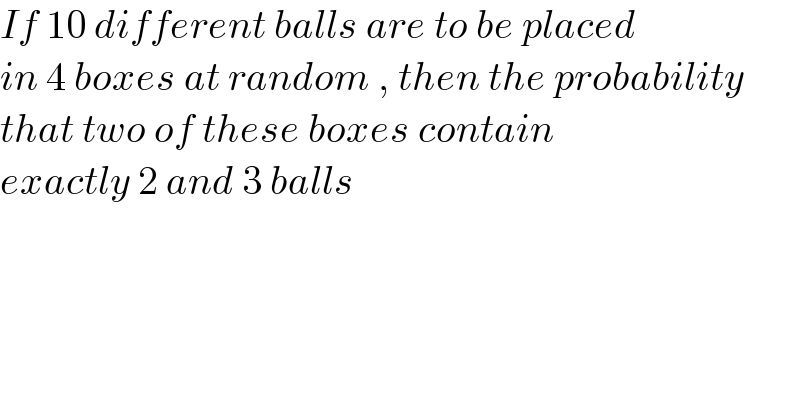
$${If}\:\mathrm{10}\:{different}\:{balls}\:{are}\:{to}\:{be}\:{placed} \\ $$$${in}\:\mathrm{4}\:{boxes}\:{at}\:{random}\:,\:{then}\:{the}\:{probability} \\ $$$${that}\:{two}\:{of}\:{these}\:{boxes}\:{contain} \\ $$$${exactly}\:\mathrm{2}\:{and}\:\mathrm{3}\:{balls}\: \\ $$
Answered by Acem last updated on 02/Dec/22
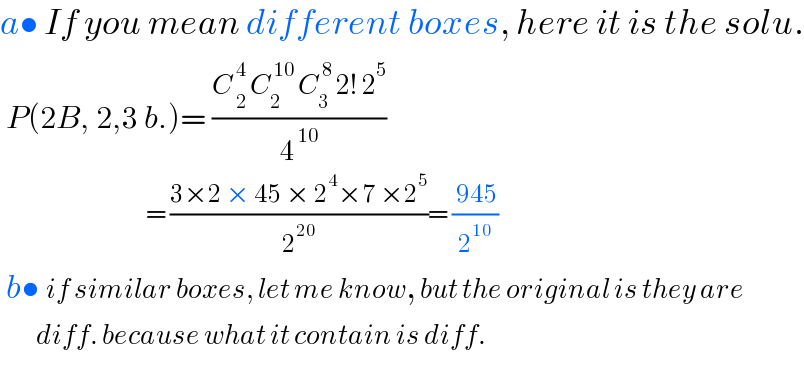
$${a}\bullet\:{If}\:{you}\:{mean}\:{different}\:{boxes},\:{here}\:{it}\:{is}\:{the}\:{solu}. \\ $$$$ \\ $$$$\:{P}\left(\mathrm{2}{B},\:\mathrm{2},\mathrm{3}\:{b}.\right)=\:\frac{{C}_{\:\mathrm{2}} ^{\:\mathrm{4}} \:{C}_{\mathrm{2}} ^{\:\mathrm{10}} \:{C}_{\mathrm{3}} ^{\:\mathrm{8}} \:\mathrm{2}!\:\mathrm{2}^{\mathrm{5}} }{\mathrm{4}^{\:\mathrm{10}} } \\ $$$$\:\:\:\:\:\:\:\:\:\:\:\:\:\:\:\:\:\:\:\:\:\:\:\:\:=\:\frac{\mathrm{3}×\mathrm{2}\:×\:\mathrm{45}\:×\:\mathrm{2}^{\mathrm{4}} ×\mathrm{7}\:×\mathrm{2}^{\mathrm{5}} }{\mathrm{2}^{\mathrm{20}} }=\:\frac{\:\mathrm{945}}{\mathrm{2}^{\mathrm{10}} } \\ $$$$\:{b}\bullet\:{if}\:{similar}\:{boxes},\:{let}\:{me}\:{know},\:{but}\:{the}\:{original}\:{is}\:{they}\:{are}\: \\ $$$$\:\:\:\:\:\:{diff}.\:{because}\:{what}\:{it}\:{contain}\:{is}\:{diff}. \\ $$$$ \\ $$
Answered by mr W last updated on 03/Dec/22
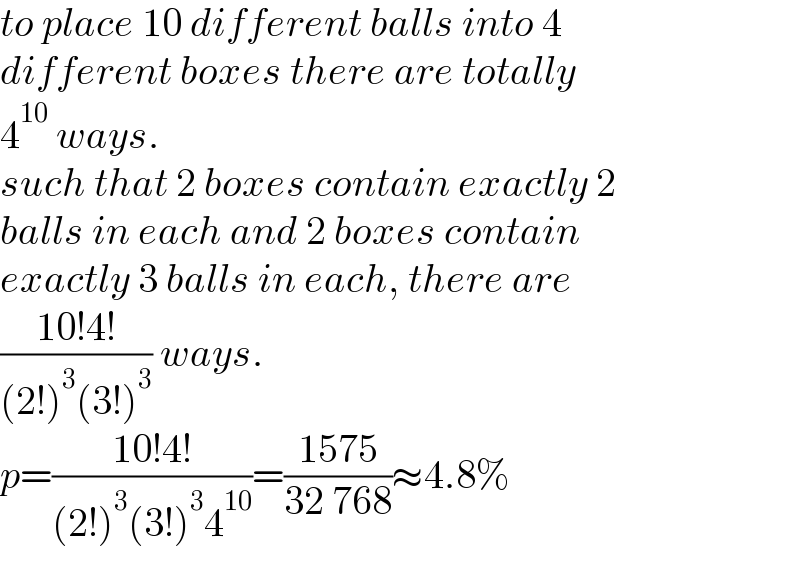
$${to}\:{place}\:\mathrm{10}\:{different}\:{balls}\:{into}\:\mathrm{4}\: \\ $$$${different}\:{boxes}\:{there}\:{are}\:{totally} \\ $$$$\mathrm{4}^{\mathrm{10}} \:{ways}. \\ $$$${such}\:{that}\:\mathrm{2}\:{boxes}\:{contain}\:{exactly}\:\mathrm{2} \\ $$$${balls}\:{in}\:{each}\:{and}\:\mathrm{2}\:{boxes}\:{contain}\: \\ $$$${exactly}\:\mathrm{3}\:{balls}\:{in}\:{each},\:{there}\:{are}\: \\ $$$$\frac{\mathrm{10}!\mathrm{4}!}{\left(\mathrm{2}!\right)^{\mathrm{3}} \left(\mathrm{3}!\right)^{\mathrm{3}} }\:{ways}. \\ $$$${p}=\frac{\mathrm{10}!\mathrm{4}!}{\left(\mathrm{2}!\right)^{\mathrm{3}} \left(\mathrm{3}!\right)^{\mathrm{3}} \mathrm{4}^{\mathrm{10}} }=\frac{\mathrm{1575}}{\mathrm{32}\:\mathrm{768}}\approx\mathrm{4}.\mathrm{8\%} \\ $$
Commented by Acem last updated on 03/Dec/22

$${Hi}\:{Sir}! \\ $$$$\:{According}\:{to}\:{the}\:{question},\:{it}\:{asks}\:{about}\:{only}\:{box} \\ $$$$\:{contains}\:\mathrm{2}\:{balls},\:{and}\:{the}\:{other}\:{contains}\:\mathrm{3}\:{balls}. \\ $$$$\:{right}? \\ $$
Commented by mr W last updated on 03/Dec/22

$${the}\:{language}\:{of}\:{the}\:{question}\:{is}\:{not}\: \\ $$$${very}\:{clear}.\:{if}\:{it}\:{says}\:``{one}\:{box}\:{contains} \\ $$$${exactly}\:\mathrm{2}\:{balls}\:{and}\:{an}\:{other}\:{box} \\ $$$${contains}\:{exactly}\:\mathrm{3}\:{balls}'',\:{then}\:{it}'{s} \\ $$$${clear}. \\ $$
Commented by Acem last updated on 03/Dec/22
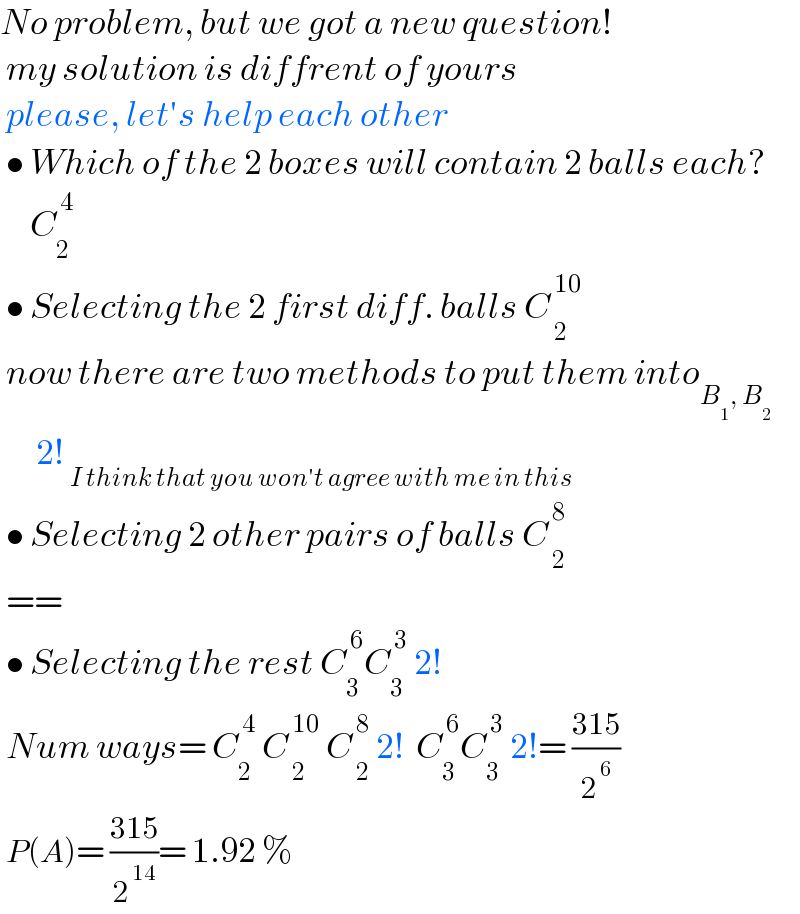
$${No}\:{problem},\:{but}\:{we}\:{got}\:{a}\:{new}\:{question}! \\ $$$$\:{my}\:{solution}\:{is}\:{diffrent}\:{of}\:{yours} \\ $$$$\:{please},\:{let}'{s}\:{help}\:{each}\:{other} \\ $$$$\:\bullet\:{Which}\:{of}\:{the}\:\mathrm{2}\:{boxes}\:{will}\:{contain}\:\mathrm{2}\:{balls}\:{each}? \\ $$$$\:\:\:\:\:{C}_{\mathrm{2}} ^{\:\mathrm{4}} \\ $$$$\:\bullet\:{Selecting}\:{the}\:\mathrm{2}\:{first}\:{diff}.\:{balls}\:{C}_{\:\mathrm{2}} ^{\:\mathrm{10}} \: \\ $$$$\:{now}\:{there}\:{are}\:{two}\:{methods}\:{to}\:{put}\:{them}\:{into}_{{B}_{\mathrm{1}} ,\:{B}_{\mathrm{2}} } \\ $$$$\:\:\:\:\:\:\mathrm{2}!\:_{{I}\:{think}\:{that}\:{you}\:{won}'{t}\:{agree}\:{with}\:{me}\:{in}\:{this}} \\ $$$$\:\bullet\:{Selecting}\:\mathrm{2}\:{other}\:{pairs}\:{of}\:{balls}\:{C}_{\:\mathrm{2}} ^{\:\mathrm{8}} \\ $$$$\:== \\ $$$$\:\bullet\:{Selecting}\:{the}\:{rest}\:{C}_{\mathrm{3}} ^{\:\mathrm{6}} {C}_{\mathrm{3}} ^{\:\mathrm{3}} \:\mathrm{2}! \\ $$$$\:{Num}\:{ways}=\:{C}_{\mathrm{2}} ^{\:\mathrm{4}} \:{C}_{\:\mathrm{2}} ^{\:\mathrm{10}} \:{C}_{\:\mathrm{2}} ^{\:\mathrm{8}} \:\mathrm{2}!\:\:{C}_{\mathrm{3}} ^{\:\mathrm{6}} {C}_{\mathrm{3}} ^{\:\mathrm{3}} \:\mathrm{2}!=\:\frac{\mathrm{315}}{\mathrm{2}^{\:\mathrm{6}} }\: \\ $$$$\:{P}\left({A}\right)=\:\frac{\mathrm{315}}{\mathrm{2}^{\:\mathrm{14}} }=\:\mathrm{1}.\mathrm{92}\:\%\: \\ $$
Commented by mr W last updated on 03/Dec/22
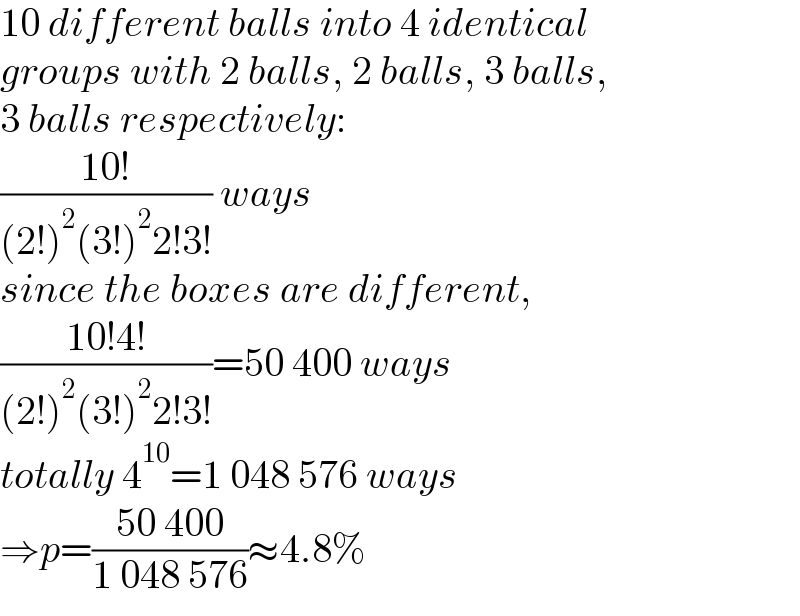
$$\mathrm{10}\:{different}\:{balls}\:{into}\:\mathrm{4}\:{identical}\: \\ $$$${groups}\:{with}\:\mathrm{2}\:{balls},\:\mathrm{2}\:{balls},\:\mathrm{3}\:{balls}, \\ $$$$\mathrm{3}\:{balls}\:{respectively}: \\ $$$$\frac{\mathrm{10}!}{\left(\mathrm{2}!\right)^{\mathrm{2}} \left(\mathrm{3}!\right)^{\mathrm{2}} \mathrm{2}!\mathrm{3}!}\:{ways} \\ $$$${since}\:{the}\:{boxes}\:{are}\:{different}, \\ $$$$\frac{\mathrm{10}!\mathrm{4}!}{\left(\mathrm{2}!\right)^{\mathrm{2}} \left(\mathrm{3}!\right)^{\mathrm{2}} \mathrm{2}!\mathrm{3}!}=\mathrm{50}\:\mathrm{400}\:{ways} \\ $$$${totally}\:\mathrm{4}^{\mathrm{10}} =\mathrm{1}\:\mathrm{048}\:\mathrm{576}\:{ways} \\ $$$$\Rightarrow{p}=\frac{\mathrm{50}\:\mathrm{400}}{\mathrm{1}\:\mathrm{048}\:\mathrm{576}}\approx\mathrm{4}.\mathrm{8\%} \\ $$
